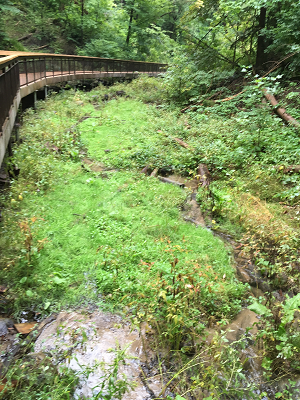Changing Currents Site Spotlight: Glen Steward Ravine
Going Green at Glen Steward Ravine
Glen Stewart Ravine is another great example of a green gem hidden within the bustling city limits of Toronto. Located in The Beaches district, Glen Stewart Ravine is a park that is home to Ames Creek which is a small stream fed by groundwater flowing south from Kingston road, through Glen Stewart Ravine, and continuing underground to Lake Ontario. Glen Stewart Ravine received a one million dollar revitalisation project in 2012 which installed a raised boardwalk and barriers to protect the fragile wetland ecosystem which exists within the ravine. Ecospark has had the opportunity to conduct its Changing Currents program within Glen Stewart Ravine at Ames Creek, several times throughout the last few years. Changing Currents is Ecospark’s flagship program which takes students from grades 6-12 out to their local stream to assess the water quality and health of the ecosystem. Ames Creek was Ecospark’s most visited stream location in the fall season of 2018. Ecospark worked with schools such as Riverdale Collegiate Institute and Monarch Park Collegiate Institute.
Ecospark conducted its first water quality study at Glen Stewart Ravine in the Spring of 2016, at which time it received a “potentially impaired” value using Ecospark’s specialized Water Quality Testing Protocol using Benthic Macroinvertebrates (BMIs) as indicator species of water quality health. Ecospark also conducted studies in the spring of 2018, as well as the aforementioned season of heavy testing in the fall of 2018. During all three seasons of testing, the stream received a “potentially impaired” value. While the protocol points to the stream being “potentially impaired,” Ecospark’s citizen scientists found that the ecosystem was dominated by one type of BMI, showing a low level of biodiversity. Biodiversity is another way that Ecospark, and scientists around the world assess stream health. The low level of biodiversity points to a conclusion that Ames Creek could be doing better.
The Friends of Glen Stewart Ravine stewardship group is known to organize park clean ups and invasive species removals. Volunteering for such organizations are great ways to get involved in improving the health of your local streams and rivers. While the biodiversity was low, the results of Ecospark’s protocol showed that other factors were doing much better. A key attributing factor could be the ravine’s recent revitalization, as well as the heavily forested banks of the stream which help to filter out toxins before they enter the creek.
The results from Ecospark’s stream studies at Glen Stewart Ravine can be found here. Glen Stewart Ravine is only one of over 70 sites that Ecospark has sampled at in the past. If you would like to see if Ecospark has sampled at a site near you, you can view their Water Quality Summary Map.
References
Rochon, Lisa. (2012). Glen Stewart revitalization revealed. Retrieved from: https://www.theglobeandmail.com/news/toronto/glen-stewart-revitalization-revealed/article4217537/
Friends of Glen Stewart Ravine. https://friendsofglenstewartravine.wordpress.com/
Matt has been an Environmental Education Assistant with Ecospark for five seasons now. He is a strong advocate for environmental and outdoor education through experiential learning. Matt has a Bachelor's degree in Physical Education with a specialization in Outdoor Adventure Leadership from Laurentian University.

